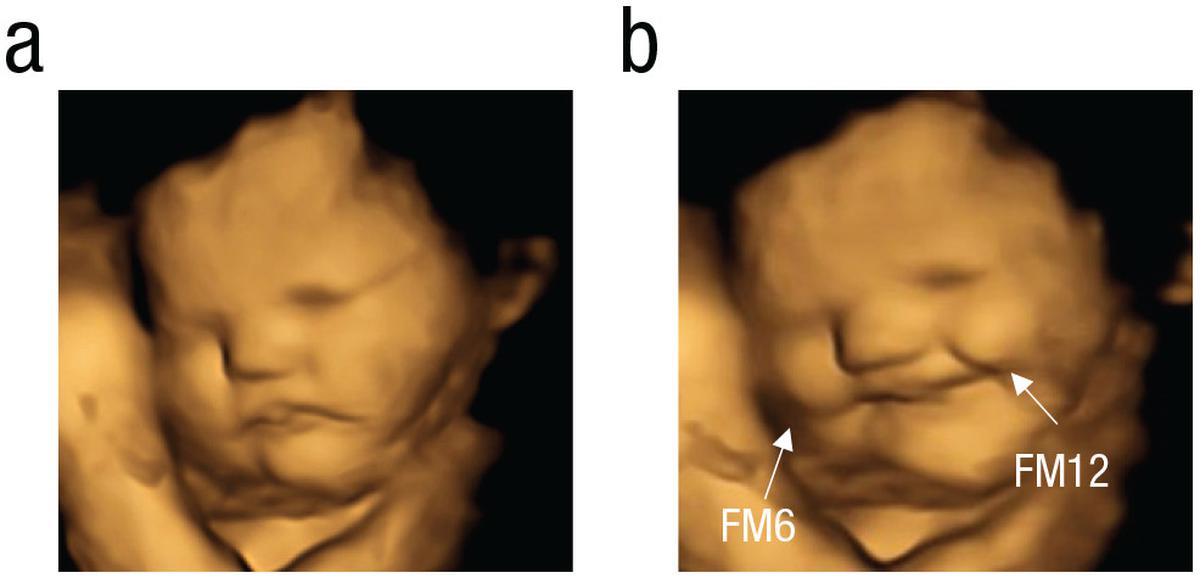Human foetuses develop style buds anatomically from 8 weeks and may detect tastes from 14 weeks onwards.
Human foetuses develop style buds anatomically from 8 weeks and may detect tastes from 14 weeks onwards.
Pregnant ladies everywhere in the world are uncovered to plenty of myths and superstition about meals. From what sort of meals to keep away from to meal timings, to-be moms are bombarded with recommendation and options from in all places.
But do the babies have a desire for what a mom eats?
A brand new research printed within the journal of Psychology Science by the researchers at Durham University, England, have discovered that babies within the womb can’t solely detect flavours and smells but additionally categorical their desire via ‘laughter face’ or ‘cry face’.
Ultrasound scan of cry-face gestalt of a kale-exposed foetus.
| Photo Credit: Psychology Science
The researchers analysed 4D ultrasound scans of 100 pregnant ladies who’re 32 to 36 weeks alongside of their pregnancies from northeast England. They discovered that the foetuses uncovered to carrot flavour confirmed ‘lip-corner puller’ or laughter-face’. While these uncovered to kale flavour confirmed ‘upper-lip raiser’, ‘lower-lip depressor’ or ‘cry-face’.
A variety of research have urged that babies can style and odor within the womb, however they’re primarily based on post-birth outcomes whereas the present research is the primary to see these reactions previous to delivery.
Explaining the research, the lead researcher Beyza Ustun stated in an e-mail to The Hindu, “We were expecting to see different facial reactions to kale and carrot because these vegetables do not share the same flavour profile, kale is bitter, and carrot is non-bitter.”

Ultrasound scan of laughter-face gestalt of a carrot-exposed foetus.
| Photo Credit: Psychology Science
The research additionally sheds mild on the sensory talents of the foetuses and their skill to show facial responses to completely different flavours.
“Kale was chosen because it conveys more bitterness to infants than other green vegetables such as spinach, broccoli, or asparagus. Carrot was chosen because postnatal studies showed that carrot is transferred to the amniotic fluid, and it does not share the same flavour profile as kale,” she added.
Human foetuses develop style buds anatomically from 8 weeks and may detect tastes from 14 weeks onwards. From 24 weeks onwards, their olfactory sensory neurone are developed sufficient to detect smells. Foetuses can sense the flavours of meals eaten by the mom by inhaling or swallowing the amniotic fluid.
Also Read: Tonga volcano blast was uncommon, might even heat the Earth
As the foetus matures, its capability to specific extra complicated expressions develop. Foetuses can contort their facial muscle groups to show extra complicated facial actions as seen on this research.
The workforce, which included scientists from Aston University, Birmingham and National Centre for Scientific Research, France, additionally consider that the outcomes of the research might make clear the event of human style and odor preceptors and its relation to reminiscence and notion.
“We are now following these babies to see their reactions to the flavours they were exposed to in the womb. In this stage, we asked mothers to have carrot or kale flavour every day in the last 3 weeks of their pregnancy. After the birth of the baby, we tested their reactions to kale and carrot within the first month. The analysis is still ongoing, but preliminary analysis shows that we might see fewer ‘cry-face’ reactions to kale if foetuses were exposed to kale in the womb because they are accustomed to the kale flavour,” she added.
Ms Ustun emphasised the significance of a nutritious diet for youngsters. “There are lots of healthy vegetables, unfortunately, with a bitter taste, that is usually not appealing to children. But the evidence of this study provides that we can change their preferences to such foods before they were even born by manipulating mother’s diet during pregnancy,” she stated.
Highlighting the implications of the research in the actual world, she added, ”The proof from the research will be useful to grasp that adjusting maternal weight loss plan can promote wholesome consuming habits for youngsters.”


